- Home
- Lemony Snicket
The Wide Window Page 2
The Wide Window Read online
Page 2
"But what will we do then, when we're awake in a room with an angry burglar?" Violet asked. "I would prefer to sleep through a burglary."
Aunt Josephine's eyes grew wide with fear. "Angry burglars?" she repeated. "Angry burglars? Why are you talking about angry burglars? Are you trying to make us all even more frightened than we already are?"
"Of course not," Violet stuttered, not pointing out that Aunt Josephine was the one who had brought up the subject. "I'm sorry. I didn't mean to frighten you."
"Well, we'll say no more about it," Aunt Josephine said, looking nervously at the tin cans as if a burglar were tripping on them at that very minute. "I'll see you at the dinner table in a few minutes."
Their new guardian shut the door, and the Baudelaire orphans listened to her footsteps padding down the hallway before they spoke.
"Sunny can have Pretty Penny," Violet said, handing the doll to her sister. "The plastic is hard enough for chewing, I think."
"And you can have the model trains, Violet," Klaus said. "Maybe you can take apart the engines and invent something."
"But that leaves you with a rattle," Violet said. "That doesn't seem fair."
"Schu!" Sunny shrieked, which probably meant something along the lines of "It's been a long time since anything in our lives has felt fair."
The Baudelaires looked at one another with bitter smiles. Sunny was right. It wasn't fair that their parents had been taken away from them. It wasn't fair that the evil and revolting Count Olaf was pursuing them wherever they went, caring for nothing but their fortune. It wasn't fair that they moved from relative to relative, with terrible things happening at each of their new homes, as if the Baudelaires were riding on some horrible bus that stopped only at stations of unfairness and misery. And, of course, it certainly wasn't fair that Klaus only had a rattle to play with in his new home.
"Aunt Josephine obviously worked very hard to prepare this room for us," Violet said sadly. "She seems to be a good-hearted person. We shouldn't complain, even to ourselves."
"You're right," Klaus said, picking up his rattle and giving it a halfhearted little shake. "We shouldn't complain."
"Twee!" Sunny shrieked, which probably meant something like "Both of you are right. We shouldn't complain."
Klaus walked over to the window and looked out at the darkening landscape. The sun was beginning to set over the inky depths of Lake Lachrymose, and a cold evening wind was beginning to blow. Even from the other side of the glass Klaus could feel a small chill. "I want to complain, anyway," he said.
"Soup's on!" Aunt Josephine called from the kitchen. "Please come to dinner!"
Violet put her hand on Klaus's shoulder and gave it a little squeeze of comfort, and without another word the three Baudelaires headed back down the hallway and into the dining room. Aunt Josephine had set the table for four, providing a large cushion for Sunny and another pile of tin cans in the corner of the room, just in case burglars tried to steal their dinner.
"Normally, of course," Aunt Josephine said, "'soup's on' is an idiomatic expression that has nothing to do with soup. It simply means that dinner is ready. In this case, however, I've actually made soup."
"Oh good," Violet said. "There's nothing like hot soup on a chilly evening."
"Actually, it's not hot soup," Aunt Josephine said. "I never cook anything hot because I'm afraid of turning the stove on. It might burst into flames. I've made chilled cucumber soup for dinner."
The Baudelaires looked at one another and tried to hide their dismay. As you probably know, chilled cucumber soup is a delicacy that is best enjoyed on a very hot day. I myself once enjoyed it in Egypt while visiting a friend of mine who works as a snake charmer. When it is well prepared, chilled cucumber soup has a delicious, minty taste, cool and refreshing as if you are drinking something as well as eating it. But on a cold day, in a drafty room, chilled cucumber soup is about as welcome as a swarm of wasps at a bat mitzvah. In dead silence, the three children sat down at the table with their Aunt Josephine and did their best to force down the cold, slimy concoction. The only sound was of Sunny's four teeth chattering on her soup spoon as she ate her frigid dinner. As I'm sure you know, when no one is speaking at the dinner table, the meal seems to take hours, so it felt like much, much later when Aunt Josephine broke the silence.
"My dear husband and I never had children," she said, "because we were afraid to. But I do want you to know that I'm very happy that you're here. I am often very lonely up on this hill by myself, and when Mr. Poe wrote to me about your troubles I didn't want you to be as lonely as I was when I lost my dear Ike."
"Was Ike your husband?" Violet asked.
Aunt Josephine smiled, but she didn't look at Violet, as if she were talking more to herself than to the Baudelaires. "Yes," she said, in a faraway voice, "he was my husband, but he was much more than that. He was my best friend, my partner in grammar, and the only person I knew who could whistle with crackers in his mouth."
"Our mother could do that," Klaus said, smiling. "Her specialty was Mozart's fourteenth symphony."
"Ike's was Beethoven's fourth quartet," Aunt Josephine replied. "Apparently it's a family characteristic."
"I'm sorry we never got to meet him," Violet said. "He sounds wonderful."
"He was wonderful," Aunt Josephine said, stirring her soup and blowing on it even though it was ice cold. "I was so sad when he died. I felt like I'd lost the two most special things in my life."
"Two?" Violet asked. "What do you mean?"
"I lost Ike," Aunt Josephine said, "and I lost Lake Lachrymose. I mean, I didn't really lose it, of course. It's still down in the valley. But I grew up on its shores. I used to swim in it every day. I knew which beaches were sandy and which were rocky. I knew all the islands in the middle of its waters and all the caves alongside its shore. Lake Lachrymose felt like a friend to me. But when it took poor Ike away from me I was too afraid to go near it anymore. I stopped swimming in it. I never went to the beach again. I even put away all my books about it. The only way I can bear to look at it is from the Wide Window in the library."
"Library?" Klaus asked, brightening. "You have a library?"
"Of course," Aunt Josephine said. "Where else could I keep all my books on grammar? If you've all finished with your soup, I'll show you the library."
"I couldn't eat another bite," Violet said truthfully.
"Irm!" Sunny shrieked in agreement.
"No, no, Sunny," Aunt Josephine said. "'Irm' is not grammatically correct. You mean to say, 'I have also finished my supper.'"
"Irm," Sunny insisted.
"My goodness, you do need grammar lessons," Aunt Josephine said. "All the more reason to go to the library. Come, children."
Leaving behind their half-full soup bowls, the Baudelaires followed Aunt Josephine down the hallway, taking care not to touch any of the doorknobs they passed. At the end of the hallway,
Aunt Josephine stopped and opened an ordinary-looking door, but when the children stepped through the door they arrived in a room that was anything but ordinary.
The library was neither square nor rectangular, like most rooms, but curved in the shape of an oval. One wall of the oval was devoted to books-rows and rows and rows of them, and every single one of them was about grammar. There was an encyclopedia of nouns placed in a series of simple wooden bookshelves, curved to fit the wall. There were very thick books on the history of verbs, lined up in metal bookshelves that were polished to a bright shine. And there were cabinets made of glass, with adjective manuals placed inside them as if they were for sale in a store instead of in someone's house. In the middle of the room were some comfortable-looking chairs, each with its own footstool so one could stretch out one's legs while reading.
But it was the other wall of the oval, at the far end of the room, that drew the children's attention. From floor to ceiling, the wall was a window, just one enormous curved pane of glass, and beyond the glass was a spectacular view of Lake Lachrymose. When th
e children stepped forward to take a closer look, they felt as if they were flying high above the dark lake instead of merely looking out on it.
"This is the only way I can stand to look at the lake," Aunt Josephine said in a quiet voice. "From far away. If I get much closer I remember my last picnic on the beach with my darling Ike. I warned him to wait an hour after eating before he went into the lake, but he only waited forty-five minutes. He thought that was enough."
"Did he get cramps?" Klaus asked. "That's what's supposed to happen if you don't wait an hour before you swim."
"That's one reason," Aunt Josephine said, "but in Lake Lachrymose, there's another one. If you don't wait an hour after eating, the Lachrymose Leeches will smell food on you, and attack."
"Leeches?" Violet asked.
"Leeches," Klaus explained, "are a bit like worms. They are blind and live in bodies of water, and in order to feed, they attach themselves to you and suck your blood."
Violet shuddered. "How horrible."
"Swoh!" Sunny shrieked, which probably meant something along the lines of "Why in the world would you go swimming in a lake full of leeches?"
"The Lachrymose Leeches," Aunt Josephine said, "are quite different from regular leeches. They each have six rows of very sharp teeth, and one very sharp nose-they can smell even the smallest bit of food from far, far away. The Lachrymose Leeches are usually quite harmless, preying only on small fish. But if they smell food on a human they will swarm around him and-and…" Tears came to Aunt Josephine's eyes, and she took out a pale pink handkerchief and dabbed them away. "I apologize, children. It is not grammatically correct to end a sentence with the word 'and', but I get so upset when I think about Ike that I cannot talk about his death."
"We're sorry we brought it up," Klaus said quickly. "We didn't mean to upset you."
"That's all right," Aunt Josephine said, blowing her nose. "It's just that I prefer to think of Ike in other ways. Ike always loved the sunshine, and I like to imagine that wherever he is now, it's as sunny as can be. Of course, nobody knows what happens to you after you die, but it's nice to think of my husband someplace very, very hot, don't you think?"
"Yes I do," Violet said. "It is very nice." She swallowed. She wanted to say something else to Aunt Josephine, but when you have only known someone for a few hours it is difficult to know what they would like to hear. "Aunt Josephine," she said timidly, "have you thought of moving someplace else? Perhaps if you lived somewhere far from Lake Lachrymose, you might feel better."
"We'd go with you," Klaus piped up.
"Oh, I could never sell this house," Aunt Josephine said. "I'm terrified of realtors."
The three Baudelaire youngsters looked at one another surreptitiously, a word which here means "while Aunt Josephine wasn't looking." None of them had ever heard of a person who was frightened of realtors.
There are two kinds of fears: rational and irrational-or, in simpler terms, fears that make sense and fears that don't. For instance, the Baudelaire orphans have a fear of Count Olaf, which makes perfect sense, because he is an evil man who wants to destroy them. But if they were afraid of lemon meringue pie, this would be an irrational fear, because lemon meringue pie is delicious and has never hurt a soul. Being afraid of a monster under the bed is perfectly rational, because there may in fact be a monster under your bed at any time, ready to eat you all up, but a fear of realtors is an irrational fear. Realtors, as I'm sure you know, are people who assist in the buying and selling of houses. Besides occasionally wearing an ugly yellow coat, the worst a realtor can do to you is show you a house that you find ugly, and so it is completely irrational to be terrified of them.
As Violet, Klaus, and Sunny looked down at the dark lake and thought about their new lives with Aunt Josephine, they experienced a fear themselves, and even a worldwide expert on fear would have difficulty saying whether this was a rational fear or an irrational fear. The Baudelaires' fear was that misfortune would soon befall them. On one hand, this was an irrational fear, because Aunt Josephine seemed like a good person, and Count Olaf was nowhere to be seen. But on the other hand, the Baudelaires had experienced so many terrible things that it seemed rational to think that another catastrophe was just around the corner.
CHAPTER Three
There is a way of looking at life called "keeping things in perspective." This simply means "making yourself feel better by comparing the things that are happening to you right now against other things that have happened at a different time, or to different people." For instance, if you were upset about an ugly pimple on the end of your nose, you might try to feel better by keeping your pimple in perspective. You might compare your pimple situation to that of someone who was being eaten by a bear, and when you looked in the mirror at your ugly pimple, you could say to yourself, "Well, at least I'm not being eaten by a bear."
You can see at once why keeping things in perspective rarely works very well, because it is hard to concentrate on somebody else being eaten by a bear when you are staring at your own ugly pimple. So it was with the Baudelaire orphans in the days that followed. In the morning, when the children joined Aunt Josephine for a breakfast of orange juice and untoasted bread, Violet thought to herself, "Well, at least we're not being forced to cook for Count Olaf's disgusting theater troupe." In the afternoon, when Aunt Josephine would take them to the library and teach them all about grammar, Klaus thought to himself, "Well, at least Count Olaf isn't about to whisk us away to Peru." And in the evening, when the children joined Aunt Josephine for a dinner of orange juice and untoasted bread, Sunny thought to herself, "Zax!" which meant something along the lines of "Well, at least there isn't a sign of Count Olaf anywhere."
But no matter how much the three siblings compared their life with Aunt Josephine to the miserable things that had happened to them before, they couldn't help but be dissatisfied with their circumstances. In her free time, Violet would dismantle the gears and switches from the model train set, hoping to invent something that could prepare hot food without frightening Aunt Josephine, but she couldn't help wishing that Aunt Josephine would simply turn on the stove. Klaus would sit in one of the chairs in the library with his feet on a footstool, reading about grammar until the sun went down, but when he looked out at the gloomy lake he couldn't help wishing that they were still living with Uncle Monty and all of his reptiles. And Sunny would take time out from her schedule and bite the head of Pretty Penny, but she couldn't help wishing that their parents were still alive and that she and her siblings were safe and sound in the Baudelaire home.
Aunt Josephine did not like to leave the house very much, because there were so many things outside that frightened her, but one day the children told her what the cabdriver had said about Hurricane Herman approaching, and she agreed to take them into town in order to buy groceries. Aunt Josephine was afraid to drive in automobiles, because the doors might get stuck, leaving her trapped inside, so they walked the long way down the hill. By the time the Baudelaires reached the market their legs were sore from the walk.
"Are you sure that you won't let us cook for you?" Violet asked, as Aunt Josephine reached into the barrel of limes. "When we lived with Count Olaf, we learned how to make puttanesca sauce. It was quite easy and perfectly safe."
Aunt Josephine shook her head. "It is my responsibility as your caretaker to cook for you, and I am eager to try this recipe for cold lime stew. Count Olaf certainly does sound evil. Imagine forcing children to stand near a stove!"
"He was very cruel to us," Klaus agreed, not adding that being forced to cook had been the least of their problems when they lived with Count Olaf. "Sometimes I still have nightmares about the terrible tattoo on his ankle. It always scared me."
Aunt Josephine frowned, and patted her bun. "I'm afraid you made a grammatical mistake, Klaus," she said sternly. "When you said, 'It always scared me,' you sounded as if you meant that his ankle always scared you, but you meant his tattoo. So you should have said, 'The tattoo always scared me.'
Do you understand?"
"Yes, I understand," Klaus said, sighing. "Thank you for pointing that out, Aunt Josephine."
"Niku!" Sunny shrieked, which probably meant something like "It wasn't very nice to point out Klaus's grammatical mistake when he was talking about something that upset him."
"No, no, Sunny," Aunt Josephine said firmly, looking up from her shopping list. "'Niku' isn't a word. Remember what we said about using correct English. Now, Violet, would you please get some cucumbers? I thought I would make chilled cucumber soup again sometime next week."
Violet groaned inwardly, a phrase which here means "said nothing but felt disappointed at the prospect of another chilly dinner," but she smiled at Aunt Josephine and headed down an aisle of the market in search of cucumbers. She looked wistfully at all the delicious food on the shelves that required turning on the stove in order to prepare it. Violet hoped that someday she could cook a nice hot meal for Aunt Josephine and her siblings using the invention she was working on with the model train engine. For a few moments she was so lost in her inventing thoughts that she didn't look where she was going until she walked right into someone.
"Excuse m-" Violet started to say, but when she looked up she couldn't finish her sentence. There stood a tall, thin man with a blue sailor hat on his head and a black eye patch covering his left eye. He was smiling eagerly down at her as if she were a brightly wrapped birthday present that he couldn't wait to rip open. His fingers were long and bony, and he was leaning awkwardly to one side, a bit like Aunt Josephine's house dangling over the hill. When Violet looked down, she saw why: There was a thick stump of wood where his left leg should have been, and like most people with peg legs, this man was leaning on his good leg, which caused him to tilt. But even though Violet had never seen anyone with a peg leg before, this was not why she couldn't finish her sentence. The reason why had to do with something she had seen before-the bright, bright shine in the man's one eye, and above it, just one long eyebrow.

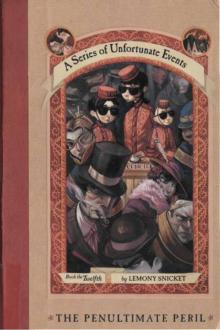 The Penultimate Peril
The Penultimate Peril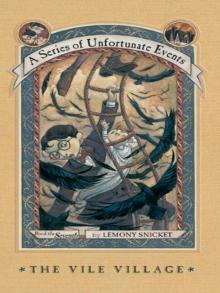 The Vile Village
The Vile Village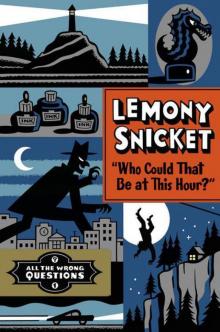 Who Could That Be at This Hour?
Who Could That Be at This Hour?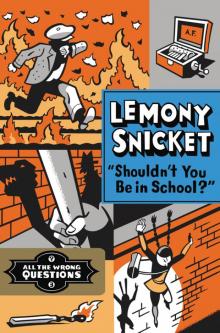 Shouldn't You Be in School?
Shouldn't You Be in School?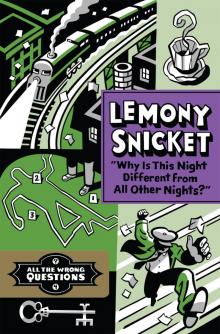 Why Is This Night Different From All Other Nights?
Why Is This Night Different From All Other Nights?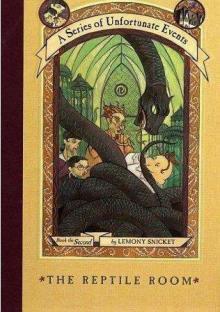 The Reptile Room
The Reptile Room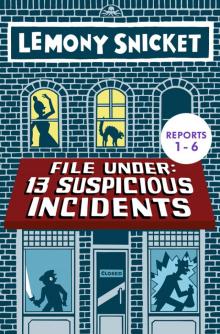 File Under: 13 Suspicious Incidents (1-6)
File Under: 13 Suspicious Incidents (1-6) The End
The End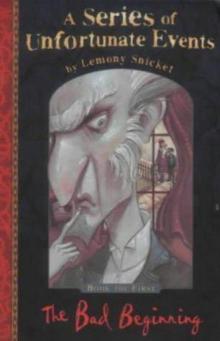 The Bad Beginning
The Bad Beginning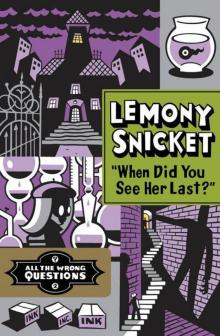 When Did You See Her Last?
When Did You See Her Last?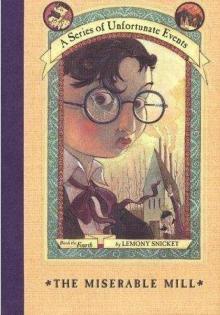 The Miserable Mill
The Miserable Mill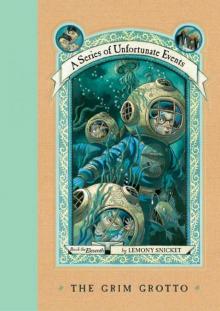 The Grim Grotto
The Grim Grotto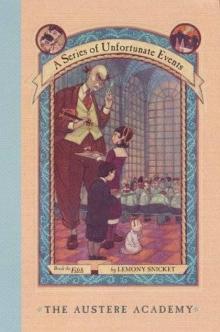 The Austere Academy
The Austere Academy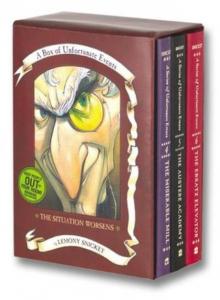 The Ersatz Elevator
The Ersatz Elevator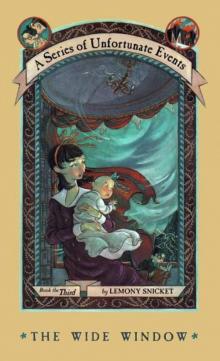 The Wide Window
The Wide Window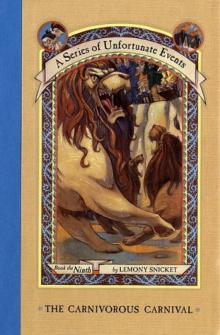 The Carnivorous Carnival
The Carnivorous Carnival A Series of Unfortunate Events Box: The Complete Wreck
A Series of Unfortunate Events Box: The Complete Wreck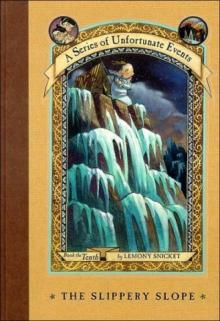 The Slippery Slope
The Slippery Slope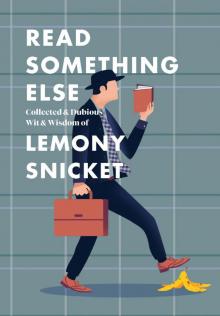 Read Something Else
Read Something Else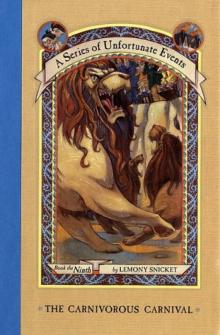 The Carnivorous Carnival asoue-9
The Carnivorous Carnival asoue-9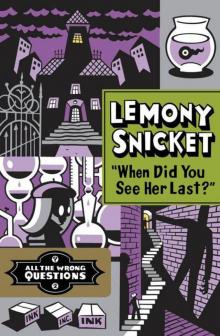 When Did You See Her Last
When Did You See Her Last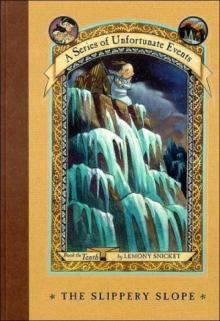 The Slippery Slope asoue-10
The Slippery Slope asoue-10 The Hostile Hospital asoue-8
The Hostile Hospital asoue-8 A Series of Unfortunate Events Collection: Books 1-13 with Bonus Material
A Series of Unfortunate Events Collection: Books 1-13 with Bonus Material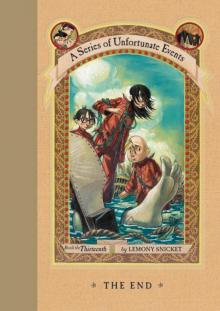 The End asoue-13
The End asoue-13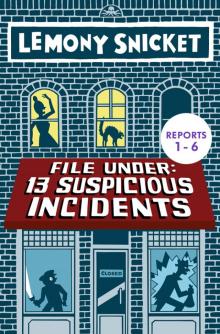 File Under
File Under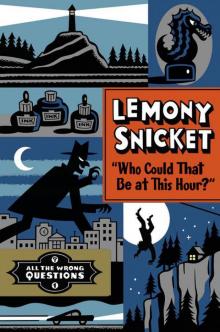 Who Could That Be at This Hour? (All the Wrong Questions)
Who Could That Be at This Hour? (All the Wrong Questions)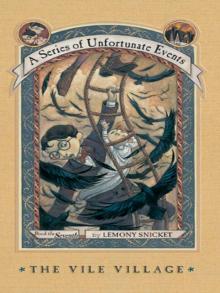 The Vile Village asoue-7
The Vile Village asoue-7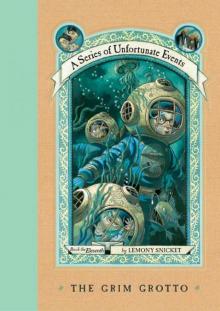 The Grim Grotto asoue-11
The Grim Grotto asoue-11